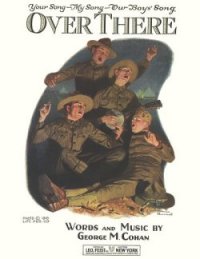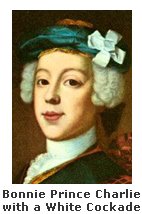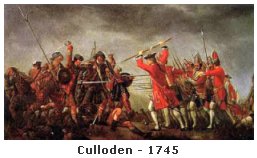
| Illuminations Home |
|
| Military
Songs |
|
| The Revolution & Before | |
| The Wabash to Mexico
City |
|
| Civil War | |
| Indian Wars | |
| Spanish-American War | |
| World War One | |
| World War Two | |
| Cold War | |
| Vietnam War | |
| Global War on Terror | |
Illuminations, Epiphanies, & Reflections
Military Songs
American
Revolution and Before - The White Cockade
 With
the Declaration of Independence, much of colonial music shifted in
theme
and became more martial in character. Additionally, existing
songs and tunes that were anti-British became popular. The most
famous example is "John Highland Man," or "The White Cockade."
Between 1688 and 1746, there were a series of primarily Scottish
uprisings in Britain, known as the Jacobite Rebellions, that
attempted to restore the Stuart dynasty to the throne. Jacobite
forces wore tartans, and adopted a white cockade worn on a blue bonnet
as their emblem after Bonnie Prince Charlie was said to have pinned a
wild white rose to his hat as he marched his army towards Derby on the
way to London. During the rebellion, "John
Highland Man," based on a tune from the mid-1600s, became a popular
subversive song in Scotland and was played by fifes and bagpipes while
marching into battle. (Robert Burns later, in 1776, With
the Declaration of Independence, much of colonial music shifted in
theme
and became more martial in character. Additionally, existing
songs and tunes that were anti-British became popular. The most
famous example is "John Highland Man," or "The White Cockade."
Between 1688 and 1746, there were a series of primarily Scottish
uprisings in Britain, known as the Jacobite Rebellions, that
attempted to restore the Stuart dynasty to the throne. Jacobite
forces wore tartans, and adopted a white cockade worn on a blue bonnet
as their emblem after Bonnie Prince Charlie was said to have pinned a
wild white rose to his hat as he marched his army towards Derby on the
way to London. During the rebellion, "John
Highland Man," based on a tune from the mid-1600s, became a popular
subversive song in Scotland and was played by fifes and bagpipes while
marching into battle. (Robert Burns later, in 1776,  wrote new lyrics to
the tune, which he titled, "My Love Was Born in Aberdeen; his work was
re-titled "The White Cockade" upon re-publication in 1790.) Although
the Jacobite Rebellions ended in 1745 with the battle of Culloden, when
after the Scottish forces were defeated by the British, the Duke of
Cumberland--to the everlasting shame of the British Army--spent two
days personally leading his men in the butchering of all prisoners and
wounded before marching into Scotland to imprison and execute as many
Jacobite supporters as he could locate. Unlike the rebellion, the
tune lived on and became
popular throughout the American colonies in the years preceding the
Revolution. wrote new lyrics to
the tune, which he titled, "My Love Was Born in Aberdeen; his work was
re-titled "The White Cockade" upon re-publication in 1790.) Although
the Jacobite Rebellions ended in 1745 with the battle of Culloden, when
after the Scottish forces were defeated by the British, the Duke of
Cumberland--to the everlasting shame of the British Army--spent two
days personally leading his men in the butchering of all prisoners and
wounded before marching into Scotland to imprison and execute as many
Jacobite supporters as he could locate. Unlike the rebellion, the
tune lived on and became
popular throughout the American colonies in the years preceding the
Revolution. |
| John
Highland
Man (The White Cockade) Traditional Lyrics:
A Highland lad my love was born,
the lowland laws he held in scorn, but he still was faithfu' to his clan, My Gallant, braw John Highland man! With hi philibeg an' tartan plaid An' guid claymore down by his side, The ladies' hearts he did trepan, My gallant braw John Highland man! But Och, they catch'd him at the last And bound him in a dungeon fast. My curse upon them every one, They've hanged my braw John Highland man. There is not a lad in a' the lan' Was match for my John Highland man! Lyrics
by Robert Burns in 1790:
My love was
born in Aberdeen,
The boniest lad that e'er was seen, But now he makes our hearts fu' sad, He takes the Field wi' his White Cockade. Chorus: O he's a ranting, roving lad, He is a brisk an a bonny lad, Betide what may, I will be wed, And follow the boy wi the White Cockade. I'll sell my rock, my reel, my tow, My gude gray mare and hawkit cow; To buy mysel a tartan plaid, To follow the boy wi the White Cockade. Chorus |